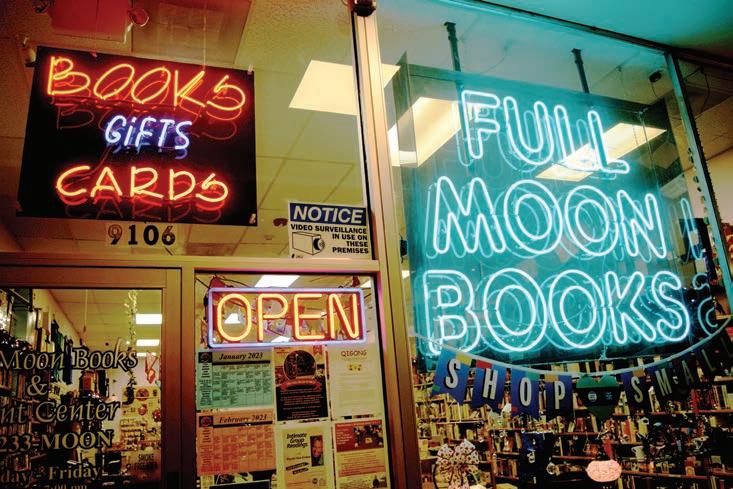
10 minute read
Could Colorado override local zoning codes to allow more density?
Conversation continues
BY ANDREW KENNEY AND NATHANIEL MINOR COLORADO PUBLIC RADIO
As the year began, Gov. Jared Polis put Colorado on notice: He wants to implement sweeping changes to how the state handles growth and development.
In his marquee State of the State speech, Polis repeated the word “housing” nearly 40 times, building on an earlier interview where he said that the state needs to encourage denser development by loosening local rules.
More than a month later, anticipation about those changes is mounting, with land-use policy — and who has the power to set it — expected to be a dominant issue in the remaining months of the legislative session. e governor has given little hint of his speci c plans, but details are ltering out. Senate Majority Leader Dominick Moreno con rmed on ursday that he’s among the tight circle working on the bill.
“Right now, it’s me and folks from the governor’s team,” Moreno said, referring to the work on the details of the bill itself.
But in the coming weeks, he hopes to share a more detailed plan with city leaders and others. It could include a broad range of possibilities, Moreno con rmed, such as: Requiring cities to create plans for addressing the housing shortage, and holding them accountable for those plans Making it easier to build accessory dwelling units (ADUs) and duplexes in certain areas across the state Making it easier to build higher-density housing around highfrequency transit stations Limiting the ability of cities to put caps on their growth rate
“We know that’s an issue at the local level, where people are concerned about further density. I’m not concerned about further density,” Moreno said. “I think the reality is (density) is the path forward out of this conundrum that we nd ourselves in.”
Still, what that path might actually look like remains unsettled.
Incentives or mandates?
Perhaps the most controversial question is whether Colorado’s government will override local zoning codes and open the door to denser development statewide, as states including California, Oregon and Maine have done.
About Letters To The Editor
Colorado Community Media welcomes letters to the editor. Please note the following rules:
• Email your letter to letters@coloradocommunitymedia.com. Do not send via postal mail. Put the words “letter to the editor” in the email subject line.


• Submit your letter by 5 p.m. on Wednesday in order to have it considered for publication in the following week’s newspaper.
• Letters must be no longer than 400 words.
“ e reality is that when you leave those decisions exclusively up to local jurisdictions, some local jurisdictions choose to take a pass. ey decide that they don’t want further development in their community,” Moreno said. “And I think the legislature is interested in having a conversation around shared responsibility … to get out of this critical housing shortage.”
When it comes to things like duplexes and ADUs, for example, lawmakers could take a couple routes. ey could o er incentives by giving grant money to cities that voluntarily cut red tape for these higher-density buildings. “If we provide funding for development, for housing, for infrastructure, we kind of expect a return on our investment,” said Moreno, a former city council member in Commerce City.
But the state also could take a more aggressive approach — saying, for example, that developers may build a duplex “by right” in zones where only single-family construction is allowed currently. Doing so would override local governments’ authority.
“I think the ‘by right’ conversation is an interesting one. I think it’s part of the conversation mix for sure,” Moreno said, adding that he’s still willing to discuss it with local leaders.
In a statement, Polis said that his team had been working with “more than 100” leaders in business, housing, local governments and environmental elds. “Although we don’t have a bill yet, we are closer,” the statement read.
• Letters should be exclusively submitted to Colorado Community Media and should not submitted to other outlets or previously posted on websites or social media. Submitted letters become the property of CCM and should not be republished elsewhere.
• Letters advocating for a political candidate should focus on that candidate’s qualifications for o ce. We cannot publish letters that contain unverified negative information about a candidate’s opponent. Letters advocating for or against a political candidate or ballot issue will not be published within 12 days of an election.
Many local o cials have taken a hard line against state intervention e lines of debate are forming already, especially on the question of state in uence in local development policies.
“Respectfully, get o our lawn,” said Kevin Bommer, executive director of the Colorado Municipal League, as he addressed a ballroom full of local leaders on ursday. He argued that cities have led the way on a ordable housing and that the state should help them rather than overrule them.
“What we want to do is work with the state in a positive way, work with the governor and the legislature in a positive way to achieve those goals that we have in common,” Bommer said in an interview.
Local o cials defended their turf throughout the Municipal League event on ursday, including Denver Mayor Michael Hancock.
“While we may share the same values around land use and a ordable housing, we will never, ever surrender local control to anyone,” Hancock said to applause.
In an email, a spokesman for Hancock said he wasn’t referencing a speci c proposal.
“Local control is Denver’s longstanding position generally,” Hancock spokesman Mike Strott wrote. “As there’s no proposal from the Governor yet, the Mayor doesn’t have a position yet.”
• Publication of any given letter is at our discretion. Letters are published as space is available.
• We will edit letters for clarity, grammar, punctuation and length and write headlines (titles) for letters at our discretion.
• Please don’t send us more than one letter per month. First priority for publication will be given to writers who have not submitted letters to us recently.
• Submit your letter in a Word document or in the body of an email. No PDFs or Google Docs, please.
A mix of advocates are hard at work on the bill
On the other side, a coalition of groups, including advocates for a ordable housing, sustainable transportation, and the environment, have been working behind the scenes to draft principles that could feed into the coming legislation.
“We’ve been developing policy concepts around smart growth housing and zoning reform for the 2023 legislative session and shared that input with the governor’s policy team,” said Matt Frommer, senior transportation associate with the Southwest Energy E ciency Project.
Another newly formed nonpro t advocacy group, Colorado Builds Better, launched this week specically to support land use reform and touted a new poll that purports to show public support for it. Group spokesman Ray Rivera declined to say who is funding the group, promising he’d share more information in the future.
“We’re going to work with people from the business community, to environmental groups, to housing advocates,” Rivera said.
Many are anxious just to see ‘Schrodinger’s zoning bill’ e bill could lead to some interesting politics. Sometimes, development reforms attract bipartisan support: Housing prices are a statewide issue, and loosening regulations is a conservative priority. is story is from CPR News, a nonpro t news source. Used by permission. For more, and to support Colorado Public Radio, visit cpr.org.
Meanwhile, with more than a quarter of the legislative session already over, lawmakers and others are anxious to see the details. One state representative, Javier Mabrey, joked that it was “Schrodinger’s zoning bill” — a proposal that either exists or doesn’t, depending how you look at it.
But they also can attract bipartisan opposition, especially in a state that has long embraced local control.
“I can tell you that on my side of the aisle, we’re really opposed to this idea,” Republican Assistant Senate Minority Leader Bob Gardner told local leaders at the CML event on ursday.
Moreno hopes to have a bill drafted and ready for introduction by the end of March — adding another big issue for the legislature’s often chaotic nal weeks.
• Include your full name, address and phone number. We will publish only your name and city or town of residence, but all of the information requested is needed for us to verify you are who you say you are.
• Letters will be considered only from people living in Colorado Community Media’s circulation area in Adams, Arapahoe, Clear Creek, Denver, Douglas, Elbert, Je erson and Weld counties.
• Do not use all caps, italics or bold text.
• Keep it polite: No name calling or “mudslinging.”
Speed dating events in metro Denver o er alternatives to swiping
BY NINA JOSS NJOSS@COLORADOCOMMUNITYMEDIA.COM
On a ursday night in late January, dozens of people walked past displays of tarot cards and crystals towards a dim room at the back of Full Moon Books in Lakewood. A man at the room’s entrance asked them each to remove their shoes. e smell of burnt sage lled the air.

For a while, people mingled. e event was not to start until 7 p.m., and stragglers arrived until moments before the doors closed. When it was time, a woman wearing a pink velvet robe asked everyone to sit in a circle.
“For all the new people, this is where we’re all going to get naked,” the woman joked. Everyone laughed, and she continued, “ ere will be none of that. is is just a really fun, safe event.”
Danny Neifert, a facilitator of an event called Tantra Speed Date, was playing with the stereotypical understanding of the word “tantra.” For many people, the term brings sex to mind. Although tantra is a spiritual practice that includes sexuality, Neifert said it has more to do with connection.
“Tonight, for the sake of simplicity, we’re just going to swap out the word ‘tantra’ with ‘connection,’” she said to the group. “It’s about connecting to yourself, connecting to the person that’s standing in front of you, connecting to the room, connecting to the building, the soil, the snow, the stars — you ll in the blank in a way that makes sense to you.” is event is one of several forms of speed dating in the metro Denver area, where singles are stepping out of their comfort zones to nd hope, chemistry — and maybe even love — beyond the screens and swiping of modern dating.
For the next several hours, the attendees took turns rotating from person to person, doing mindful activities with a new partner at each station. At one, a partner mirrored the others’ physical actions. Next, strangers gave each other back massages. Some stations involved speaking — about gratitude, letting go or joy — and at others, people danced.
Paying attention
Guy Shahar is a founder of e Tantra Institute, a New York-based company that aims to help people become “better lovers” through sacred sexuality. e company teaches courses about sexuality, tantra and relationship skills, in addition to hosting events like Tantra Speed Date.
Since 2017, Tantra Speed Date has hosted over 550 events in 40 cities for attendees of all ages.
“Most of the stations are really just about (giving) people instructions that show them how to put their attention on each other,” Shahar said about the speed dating event.
In his eyes, lack of attention is the number one challenge people face in modern dating, partly because of technology and partly because of the number of potential partners.
“A hundred years ago, who could you date? e people from your neighborhood, the people around you,” he said. “Now you can date anybody in the world… You open up any of those dating apps and you could be swiping on a di erent person in less than a second.”
His speed dating event, he said, is designed to put people in situations where they must focus on each other.
“Like a mirroring exercise, right?” he said. “I’m watching you, and I’m responding to what you’re doing… My attention is on you… Getting people to bring their attentions to each other is a really beautiful way to fool them into connection and intimacy.”
Once people surrender to paying full attention, Shahar said it’s easier to tell if there is chemistry between them.
After the initial connection, Shahar said other things become important as a relationship continues.
“ at connection isn’t necessarily compatibility,” he said. “You might have an amazing connection, or let’s say amazing chemistry… but their habits might be totally not compatible with yours. If you want a sustaining relationship, then you need to nd some points of compatibility or you need to be able to work with habits.” at being said, Shahar thinks having the opportunity to initially sense a connection is a powerful way to see if there’s any potential with a person.


“(To) just start your relationship o with that kind of intimacy and connection just seems like a really great, really beautiful way to get yourself o on the right foot,” he said.
Is a few minutes enough?
For speed dating skeptics, it may seem improbable that a person could have any sense of real connection after an encounter that lasts only a matter of minutes.

Dr. Randi Smith, a practicing psychologist and psychology professor at Metro State University Denver, said a few minutes might not be enough to tell a lot about a potential partner –but it can show some things.
“ ere’s some really recent research that suggests that we’re able to pick up on somebody’s relationship anxiety, their attachment anxiety, in a very brief interaction,” she said. “So can we predict whether this relationship will have legs, whether it will have a future? Probably not, but we might be able to weed out some people whose anxiety might prevent them from having a good relationship with us.”
In addition, Smith said quick interactions can give people a sense of physical attraction and even immediate emotional attraction based on how it feels to talk to a potential partner.
On a deeper psychological level, she said people at speed dating events are probably thinking about reciprocity of liking. is idea is that people tend to like those who like them.
“Speed dating is very strategic, right?” she said. “You have little time, you’ve got to gure out how to make these choices, and so our brains are going into high strategic, albeit









